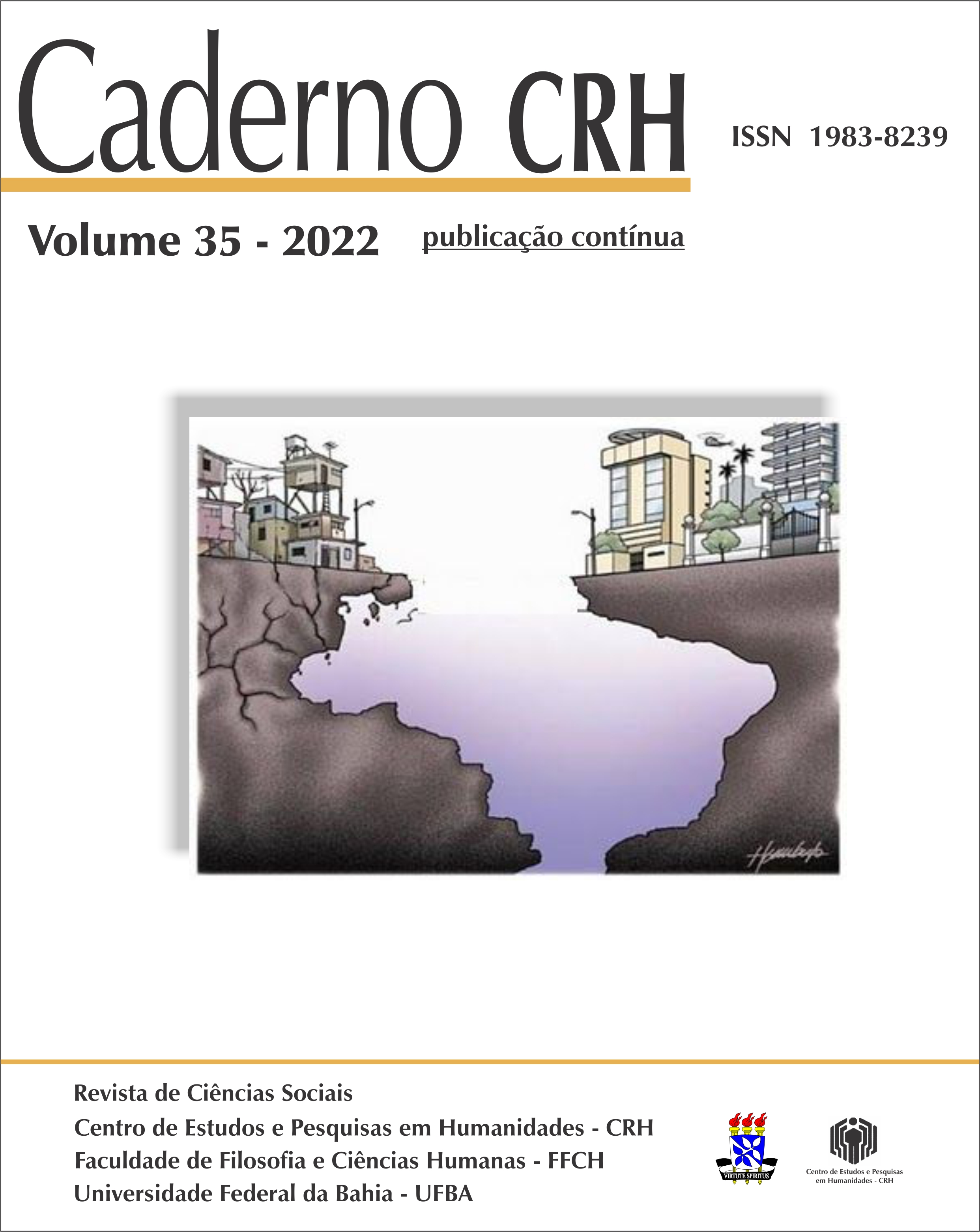UNDERSTANDING AND TRYING TO RECONCILE THE CLIMATE AND THE DIGITAL TRANSITIONS
DOI:
https://doi.org/10.9771/ccrh.v35i0.49619Keywords:
climate transition, digital transformation, environmental, Digitization of the Economy, WorkAbstract
This article focuses on the two main transitions in the current context: the climate and environmental transition and the digital one (digitization of the economy). It emphasizes that thinking and planning for the future is impossible without combining and integrating them. This is because, since the reflections on these transitions are still dispersed most of the time, they cannot show the full meaning of the changes, nor the specific impacts, such as those related to the world of work. Thus, from a more holistic point of view, we seek to analyze the two meta-changes, considering their possible articulations and hierarchies, the consensus and dissent between them, as well as the role of the different social actors in conducting these transitions.
Downloads
References
ANDERSON, C. Makers the new industrial revolution. New York: Crown Business Book, 2012.
ARNTZ, M. et al. The risk of automation for jobs in OECD countries: a comparative analysis. Paris: OCDE, 2016. 34 p. Disponível em: https://www.oecd-ilibrary.org/social-issues-migration-health/the-risk-of-automation-for-jobs-in-oecd-countries_5jlz9h56dvq7-en. Acesso em: 20 jun. 2022.
AUTOR, D. et al. The work of the future, building better jobs in an age of intelligent machines. Cambridge, MA: MIT Press, 2021. Disponível em: https://workofthefuture.mit.edu/research-post/the-work-of-the-future-building-better-jobs-in-an-age-of-intelligent-machines/. Acesso em: 20 jun. 2022.
BALDWIN, R. The globotics upheaval: globalisation, robotics and the future of work. London: Weidenfeld & Nicolson, 2020.
BAUWENS, M. et al. Sauver le monde: vers une économie post-capitaliste avec le peer-to-peer. Paris: Les Liens qui libèrent, 2015.
BUNDESMINISTERIUM FÜR BILDUNG UND FORSCHUNG – BMBF. Industrie 4.0. Berlin, 21 jan. 2016. Disponível em: https://www.bmbf.de/de/zukunftsprojekt-industrie-4-0-848.html. Acesso em: 20 maio 2022
BOCK, A. K. et al. The future of EU collaborative economy: JRC Science for Policy report. Luxembourg: Publications Office of the European Union, 2016.
BOYER, R. Economie politique des capitalismes, théorie de la régulation et des crises. Paris: La Découverte, 2015.
BP Statistical Review of world energy. 66. ed. London, Jun. 2017. Disponível em: http://oilproduction.net/files/especial-BP/bp-statistical-review-of-world-energy-2017-full-report.pdf. Acesso em: 20 maio 2022.
CASILLI, A. En attendant les robots. Paris: Seuil, 2019.
CHARBONNIER, P. Culture écologique. Paris: Presses de Sciences Po, 2022.
DEGRYSE, C. Digitalisation of the economy and its impact on labour markets. Brussels: ETUI, 2016. (Working Paper 2016.02). Disponível em: https://www.etui.org/sites/default/files/ver%202%20web%20version%20Working%20Paper%202016%2002-EN%20digitalisation.pdf. Acesso em: 15 abr. 2022.
DE STEFANO V.; TAES, S. Algorithmic management and collective bargaining. Brussels: ETUI, 2021. (Foresight Brief 2021/1). Disponível em: https://www.etui.org/sites/default/files/2021-05/Algorithmic%20management%20and%20collective%20bargaining-web-2021.pdf. Acesso em: 15 abr. 2022
EKBIA, H. et al. Heteromation and other storie of computing and capitalism. International Labour Review, Hoboken, v. 156, n. 3-4, p. 553-558, dez. 2017.
EUROFOUND. Anticipating and managing the impact of change: initiatives to improve conditions for platform workers – aims, methods, strengths and weaknesses. Luxembourg: Publications Office of the European Union, 2021. 28 p. Disponível em: https://www.eurofound.europa.eu/sites/default/files/ef_publication/field_ef_document/ef21035en.pdf. Acesso em: 20 maio 2022.
EUROPEAN POLITICAL STRATEGY CENTRE – EPSC. EPSC Strategic Notes: The future of work, skills and resilience for a world of change. Brussels: European Commission, 2016. 16 p. Disponível em: file:///C:/Users/Usuario/Downloads/ESAA16013ENN.en.pdf. Acesso em: 20 maio 2022.
EUROPEAN TRADE UNION INSTITUTE – ETUI. Shaping the digital economy 2030: six scenarios from research to action. Brussels: ETUI, 2017.
FING. Transitions cahier d’enjeux et de prospective, question numérique. Paris: Fing, 2015.
FLIPO, F.; DOBRÉ, M.; MICHOT, M. La face caché du numérique: L’impacte environnemental des nouvelles technologies. Paris: L’échappée, 2013.
FREY, C. B.; OSBORNE, M. A. The future of employment: how susceptible are jobs to computerisation? Oxford: University of Oxford, 2013. Disponível em: https://www.oxfordmartin.ox.ac.uk/downloads/academic/The_Future_of_Employment.pdf. Acesso em: 20 jun. 2022.
HART, S. Capitalism at the crossroads: aligning business, earth, and humanity. Upper Saddle River: Wharton School Publishing, 2007.
INTERNET ACTU. Qu’est-ce que le numérique peut apporter à l’écologie? Le Monde, Paris, 5 mar. 2016. Disponível em: https://www.lemonde.fr/blog/internetactu/2016/03/05/quest-ce-que-le-numerique-peut-apporter-a-lecologie/. Acesso em: 15 abr. 2022.
LAURENT, E.; POCHET, P. Pour une transition sociale-écologique: quelle solidarité face aux défis environnementaux? Paris: Les Petits Matins, 2015.
MEDA, D. La mystique de la croissance: comment s’en libérer? Paris: Flammarion, 2013.
MEDA, D. Technological revolutions and techno-economic paradigms. Journal of Economics, Cambridge, v. 34, n. 1, p. 185-202, 2010.
PEREZ, C. Revoluciones tecnológicas y capital financiero: la dinámica de las burbujas financieras y las épocas de bonanza. México: Siglo XXI, 2004.
PIASNA, A. et al. The platform economy in Europe: results from the second ETUI Internet and Platform Work Survey. Brussels: ETUI, 2022. 60 p. (Working Paper 2022.05). Disponível em: https://www.etui.org/sites/default/files/2022-02/The%20platform%20economy%20in%20Europe_2022.pdf. Acesso em: 15 abr. 2022.
POCHET, P. Concilier deux futurs: notes de prospective. Brussels: ETUI, 2017. 12 p. Disponível em: https://www.etui.org/fr/publications/notes-de-prospective/concilier-deux-futurs. Acesso em: 20 abr. 2022.
POCHET, P. Globalisation, telemigrants and working conditions. Social Europe, [s. l.], nov. 2021. Disponível em: https://socialeurope.eu/globalisation-telemigrants-and-working-conditions. Acesso em: 20 abr. 2022.
RODRIK, D.; STANTCHEVA, S. Fixing capitalism’s good jobs problem. Oxford Review of Economic Policy, Oxford, v. 37, n. 4, p. 824-837, 2021.
STERN, N. Why are we waiting? The logic, urgency and promise of tackling climate change. Cambridge, MA: MIT Press, 2015.
THIEL, P. De zéro à un: comment construire le futur. Paris: Jean-Claude Lattès, 2016.
VALENDUC, G.; VENDRAMIN, P. Work in the digital economy: sorting the old from the new. Brussels: ETUI, 2016. 52 p. (Working Paper 2016.03). Disponível em: https://www.etui.org/sites/default/files/16%20WP%202016%2003%20Digital%20economy%20EN%20Web%20version.pdf. Acesso em: 15 abr. 2022.
Downloads
Published
How to Cite
Issue
Section
License

This work is licensed under a Creative Commons Attribution 4.0 International License.
Todo o conteúdo da revista, exceto onde indicado de outra forma, é licenciado sob uma atribuição do tipo Creative Commons BY.
O periódico Caderno CRH on-line é aberto e gratuito.





